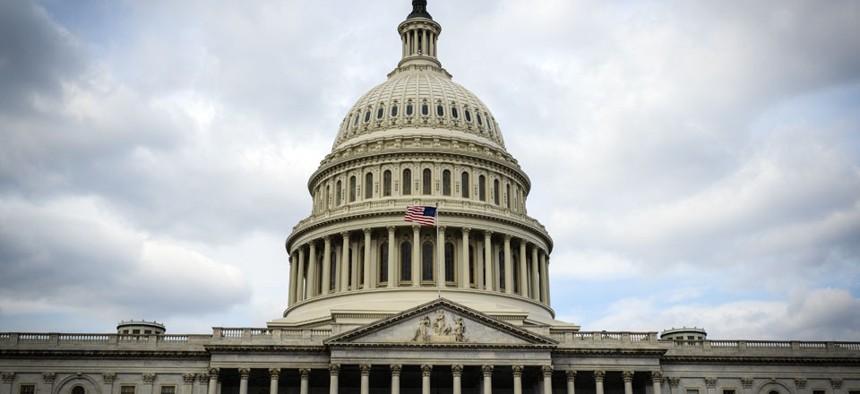This Is What the Republican Plan for Net Neutrality Looks Like

Brandon Bourdages/Shutterstock.com
GOP lawmakers are desperately trying to find a compromise on Internet regulation—but Democrats are in no hurry.
In a strange reversal of roles, Republican lawmakers on Wednesday called for net-neutrality legislation to restrict the ability of broadband providers to manipulate Internet traffic while Democrats showed little enthusiasm for the measure.
Republicans have long considered net neutrality just another anti-business, big-government takeover by the Obama administration, while Democrats have argued that tough rules are critical for protecting online freedom.
Republicans are rethinking that position as the Federal Communications Commission prepares to implement President Obama's net-neutrality plan that would essentially treat the Internet like a utility.
The only option Congress has to avoid that outcome is to give the FCC some other authority to enact net-neutrality protections. So, Republicans have swallowed their pride and drafted a bill to bar Internet providers from blocking online content, slowing down traffic, or offering any pay-for-priority deals. The legislation would cover connections both at home and on mobile devices.
The House and Senate Commerce Committees held back-to-back hearings Wednesday to consider the draft legislation. Republican Rep. Greg Walden of Oregon, the chairman of the House Communications and Technology Subcommittee, said during his panel's hearing that congressional action "is the only way to bring clarity and certainty to Internet governance."
Senate Commerce Committee Chairman John Thune, a South Dakota Republican, said his bill is "a good-faith proposal to find common ground" and is not meant to be partisan. "Congress needs to reassert its responsibility to make policy, and let the FCC do what it does best—enforce clear statutory rules," he said.
Conservatives fell in line with their leaders' strategy, but they weren't all happy about it. "Chairman Walden is bringing some of us kicking and screaming along with him," said Republican Rep. John Shimkus of Illinois.
Democrats congratulated Republicans for finally seeing the light on net neutrality. "I'm Catholic, and we understand confession," said Rep. Anna Eshoo of California, the subcommittee's top Democrat.
But Democrats feel no urgency to negotiate just as they are on the verge of a major victory at the FCC. They said they're open to considering net-neutrality legislation, but they urged the FCC to move ahead with new rules, which are scheduled for a vote on Feb. 26.
"It has taken the FCC—the expert agency—nearly 13 months to craft new rules that respond to the needs of the American public," said Rep. Frank Pallone of New Jersey, the top Democrat on the full House Energy and Commerce Committee. "Congress cannot be expected to work it all out in 13 days."
Florida's Bill Nelson, the top Democrat on the Senate Commerce Committee, also said he's not worried if the FCC enacts new rules before Congress addresses the issue.
The Democrats outlined a number of concerns with the Republican draft bill, warning it could limit the FCC's ability to protect consumers and leave loopholes that could still allow providers to charge for access to special Internet "fast lanes."
In addition to granting the FCC new power to protect net neutrality, the Republican bill would bar the agency from using other legal authorities to regulate the Internet. Thune indicated he would be happy to negotiate details of his bill, but that he won't accept any deal that "would leave the FCC's authority unbounded or would leave open the possibility for harmful regulatory burdens being leveled on the Internet."
Republicans will almost certainly need broad bipartisan support if they want Obama to sign their bill into law.
Broadband industry lobbyists praised the legislation, seeing it as the only way to keep the FCC from classifying the Internet as a utility. Michael Powell, the president of the National Cable and Telecommunications Association, and Meredith Attwell Baker, the president of CTIA-the Wireless Association, both vowed to fight the FCC in court if it enacts Obama's net neutrality plan.
"We have every confidence we would prevail in such an effort, but it is not our preferred course," said Baker, whose group represents Verizon, AT&T, and other cellular providers.
Speaking to reporters after the House hearing, Walden said Democrats should take the threats from the broadband providers seriously. His bill is the best chance to put net neutrality rules on firm legal ground, he argued.
"What we hold the promise of is legal certainty," he said. "We can do it statutorily and clearly."
—Updated at 4:47 p.m.
(Image via Brandon Bourdages/Shutterstock.com)






